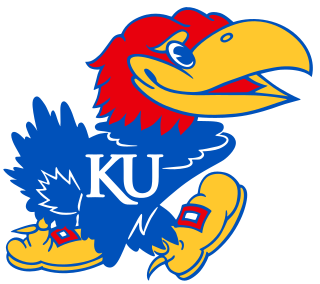
I'm a Jayhawk is the fight song of the University of Kansas.

I'm a Jayhawk is the fight song of the University of Kansas.
The original lyrics and music were written by George "Dumpy" Bowles in 1911. The lyrics to the song are generally not sung, instead, fans do a specific clap as the KU band plays the melody. The university bands do not play the intro, but only play the chorus of the song.
The song was updated in 1958 to reflect the teams of the Big 8 Conference. The lyrics were rewritten again in 2010 to account for the departure of Nebraska and Colorado from the Big 12 Conference. [1] The school has elected to not rewrite the lyrics following the departure of Texas A&M and Missouri from the league.
Bowles' original wording of the song is as follows. [2]
Talk about the Sooners, the Cowboys and the Buffs,
Talk about the Tiger and his tail,
Talk about the Wildcat, and those Cornhuskin’ boys,
But I’m the bird to make’em weep and wail,
‘Cause I’m a Jay, Jay, Jay, Jayhawk
Up at Lawrence on the Kaw
‘Cause I’m a Jay, Jay, Jay, Jayhawk
With a sis-boom hip hoorah.
‘Cause I’m a Jay, Jay, Jay, Jayhawk
Up at Lawrence on the Kaw
‘Cause I’m a Jay, Jay, Jay, Jayhawk
With a sis-boom hip hoorah,
Got a bill that’s big enough to twist the Tiger’s tail,
Husk some corn and listen to the Cornhusker’s wail,
‘Cause I’m a Jay, Jay, Jay, Jayhawk
Riding on a Kansas Gale!

The Kansas Jayhawks, commonly referred to as simply KU or Kansas, are the athletic teams that represent the University of Kansas. KU is one of three schools in the state of Kansas that participate in NCAA Division I. The Jayhawks are also a member of the Big 12 Conference. KU athletic teams have won fifteen national championships all-time, with twelve of those being NCAA Division I championships: four in men's basketball, one in men's cross country, three in men's indoor track and field, three in men's outdoor track and field, and one in women's outdoor track and field. Kansas basketball also won two Helms Foundation National Titles in 1922 and 1923, and KU Bowling won the USBC National Title in 2004.

Mark Thomas Mangino is a former American college football coach. He served as the head football coach at the University of Kansas from 2002 to 2009. In 2007, Mangino received several national coach of the year honors after leading the Jayhawks to their only 12-win season in school history and an Orange Bowl victory. However, he resigned as coach at Kansas two seasons later following allegations of mistreatment of players. While at Kansas, Mangino coached in four bowl games with a 3–1 record, the lone loss coming in the 2003 Tangerine Bowl. Additionally, in five of his eight seasons at Kansas, the Jayhawks were Bowl eligible; they had been bowl eligible only five times in the previous thirty seasons. He held multiple assistant coaching jobs before becoming the head coach at Kansas, the longest being an eight season stint at Kansas State as their running game coordinator.

The Kansas Jayhawks football program is the intercollegiate football program of the University of Kansas. The program is classified in the National Collegiate Athletic Association (NCAA) Division I Bowl Subdivision (FBS), and the team competes in the Big 12 Conference. The Jayhawks are led by head coach Lance Leipold.

The Missouri Tigers football program represents the University of Missouri in college football and competes in the Football Bowl Subdivision (FBS) of the National Collegiate Athletic Association (NCAA).
"Rock Chalk, Jayhawk" is a chant used at University of Kansas Jayhawks sporting events. The chant is made up of the phrase "Rock chalk, Jayhawk, KU".
Baby Jay is one of the costume mascots of the Kansas Jayhawks. Together, Big Jay and Baby Jay are Jayhawks and are the mascots used by the University of Kansas. Another mascot named Centennial Jay was temporarily used in 2012.

The Marching Jayhawks, is a 380-piece marching band consisting of woodwinds, brass, percussion, and color guard, representing the University of Kansas in Lawrence, Kansas. The band performs at all home football games and occasionally travels to away games. They also send smaller ensembles to pep rallies around the Kansas City area. The band marches in parades on campus and in downtown Lawrence. The volleyball and basketball pep bands play at all home games and will often travel for post-season play.
The 2008 FedEx Orange Bowl was a post-season college football bowl game between the Virginia Tech Hokies and the Kansas Jayhawks on January 3, 2008, at Dolphin Stadium in Miami Gardens, Florida. Spread bettors favored Virginia Tech by three points, but in a game dominated by defensive and special teams play, Kansas defeated Virginia Tech 24–21. The game was part of the 2007–08 Bowl Championship Series (BCS) of the 2007 NCAA Division I FBS football season and was the concluding game of the season for both teams. This 74th edition of the Orange Bowl was televised in the United States on Fox and was watched by more than eight million viewers.

The 2007 Kansas Jayhawks football team represented the University of Kansas in the 2007 NCAA Division I FBS football season. The Jayhawks, coached by Mark Mangino in his sixth year with the program, finished the season 12–1 overall, a school record for wins, and 7–1 in Big 12 conference play. They defeated Virginia Tech in the 2008 Orange Bowl, the Jayhawks first and only BCS bowl victory. They finished the season ranked No. 7 in both major polls.

The Border War is a rivalry between the athletic programs of the University of Kansas and the University of Missouri. It has been officially named the Border Showdown since 2004, and promoted as the Hy-Vee Hoops Border Showdown for basketball games since 2021. The rivalry is more known for football and men's basketball, however, the rivalry exists in all sports. The Kansas Jayhawks and the Missouri Tigers began playing each other in 1891. From 1907 to 2012 both schools were in the same athletic conference and competed annually in all sports. Sports Illustrated described the rivalry as the oldest rivalry west of the Mississippi River in 2011, but went dormant after Missouri departed the Big 12 Conference for the Southeastern Conference on July 1, 2012. Despite Missouri wanting to continue athletic competition, no further regular season games were scheduled between the two schools for several years. However, the two schools played an exhibition game in men's basketball on October 22, 2017, with Kansas defeating Missouri 93–87. Proceeds went to four different charities for Hurricane Harvey and Hurricane Maria relief funds. On October 21, 2019, the schools agreed to play six basketball games beginning in 2020, however, due to the COVID-19 pandemic, the renewal was postponed one season. Then, on May 2, the schools made an agreement for football games to be played in 2025, 2026, 2031, and 2032. On December 11, 2021, the rivalry was renewed in Allen Fieldhouse, when the Jayhawks beat the Tigers 102–65.

The 2008–09 Kansas Jayhawks men's basketball team represented the University of Kansas in the 2008–09 NCAA Division I men's basketball season, the Jayhawks' 111th basketball season. The head coach was Bill Self, serving his 6th year. The team played its home games in Allen Fieldhouse in Lawrence, Kansas, and were the defending National Champions. The AP poll released on January 26, 2009, had the Jayhawks unranked, which was the last poll in which the Jayhawks were not ranked until February 8, 2021. The following week, Kansas entered the rankings at number 21, beginning what is the longest streak in Men's Basketball history with 223 consecutive polls being ranked and achieved that record on November 30, 2020. They are 2 ahead of UCLA's 221 straight weeks that was done from 1967 to 1980.
Big Jay is one of the costume mascots of the Kansas Jayhawks. Together, Big Jay and Baby Jay are Jayhawks and are the mascots used by the University of Kansas. Another mascot named Centennial Jay was temporarily used in 2012.
The 1960 Missouri Tigers football team was an American football team that represented the University of Missouri in the Big Eight Conference during the 1960 college football season. The team compiled an 11–0 record, won the Big 8 championship, defeated Navy in the Orange Bowl, was ranked No. 5 in the final AP Poll, and outscored its opponents 295 to 93. Led by third-year head coach Dan Devine, the team played its home games at Memorial Stadium in Columbia, Missouri.

"D.O.A. " is a song written by American rapper Jay-Z and produced by No I.D. The song was released as a digital download on June 23, 2009, and as the first single from Jay-Z's 11th studio album, The Blueprint 3. The song made its world premiere on the New York radio station Hot 97 on June 5. Its lyrics address the overusage of Auto-Tune in the music industry. The song samples "In the Space" by the Montenegrin composer Janko Nilović. The bridge is inspired by Steam's "Na Na Hey Hey Kiss Him Goodbye" and interpolates lyrics from Kanye West's "Big Brother", and "You're Nobody " by The Notorious B.I.G. The song won Jay-Z his eighth Grammy Award, and his second for Best Rap Solo Performance. It peaked at No. 24 on Billboard Hot 100.

The 2010 Kansas Jayhawks football team represented the University of Kansas in the 2010 NCAA Division I FBS football season which was the school's 121st season. The Jayhawks played their home games on Kivisto Field at Memorial Stadium in Lawrence, Kansas.
The 1956–57 Kansas Jayhawks men's basketball team was a Division I college basketball team that represented the University of Kansas. Coached by Dick Harp, the Jayhawks posted a 24–3 win–loss record, winning the then-Big Seven Conference and qualifying for the 1957 NCAA Division I men's basketball tournament. Kansas won three games in the NCAA tournament to reach the championship game, where the Jayhawks lost to North Carolina in triple overtime.

The 2011 Kansas Jayhawks football team represented the University of Kansas in the 2011 NCAA Division I FBS football season. The Jayhawks were led by second year head coach Turner Gill and played their home games at Memorial Stadium. They were a member of the Big 12 Conference.
The 1960 Kansas Jayhawks football team represented the University of Kansas during the 1960 college football season. The Jayhawks were led by third-year head coach Jack Mitchell and played their home games at Memorial Stadium in Lawrence, Kansas.
The 1937 Kansas Jayhawks football team represented the University of Kansas in the Big Six Conference during the 1937 college football season. In their sixth season under head coach Adrian Lindsey, the Jayhawks compiled a 3–4–2 record, finished in third place in the conference, and were outscored by opponents by a combined total of 74 to 72. They played their home games at Memorial Stadium in Lawrence, Kansas.

The 2022 Kansas Jayhawks football team represented the University of Kansas in the 2022 NCAA Division I FBS football season. It was the Jayhawks 133rd season. The Jayhawks played their home games at David Booth Kansas Memorial Stadium in Lawrence, Kansas, and competed in the Big 12 Conference. They were led by second-year head coach Lance Leipold. The Jayhawks finished the season 6–7 overall and 3–6 in the Big 12. They qualified for the 2022 Liberty Bowl where they lost to Arkansas.